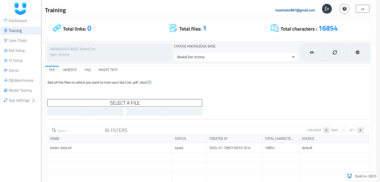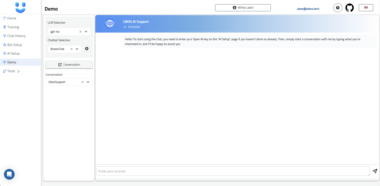MCP Server: Unleashing the Power of Context for AI Agents with UBOS
The MCP Server offers a robust foundation for building high-performance applications, particularly those leveraging AI agents and large language models (LLMs). Built upon the efficient epoll model, it provides a versatile solution for handling HTTP requests, managing memory allocation, and even simulating shell environments. When integrated with the UBOS platform, MCP Server becomes a crucial component for providing context and enabling seamless interaction between AI agents and external data sources.
Core Components & Functionality
The MCP Server encompasses four key elements, each addressing specific functionalities:
HTTP Server (epoll-based): At its heart lies an HTTP server meticulously crafted using the
epollmodel. This design choice ensures optimal performance and scalability, allowing the server to handle numerous concurrent connections efficiently. Key features include:- Unified Event Source: The server leverages a unified event source, streamlining event handling and reducing overhead.
- Timer Management: An integrated timer heap meticulously manages inactive connections, preventing resource exhaustion and ensuring server stability.
- Thread Pool Processing: A thread pool efficiently handles incoming requests, distributing the workload and maximizing throughput. This architecture enables parallel processing, leading to faster response times and improved overall performance.
- HTTP Parsing with State Machine: A state machine meticulously parses HTTP requests, extracting relevant information and routing requests to the appropriate handlers. This ensures accurate and reliable request processing.
- Static File Serving: The server efficiently serves static files, making it suitable for hosting web applications and delivering content to users.
Malloclab-handout: Memory Allocator: This component provides a sophisticated memory allocator based on the segregated fit algorithm. It utilizes a doubly linked list to manage free memory blocks, enabling efficient allocation and deallocation of memory. Key benefits include:
- Segregated Fit: This technique divides the free memory into multiple lists, each containing blocks of a specific size. This significantly reduces search times and improves allocation efficiency.
- Doubly Linked List: The use of a doubly linked list allows for efficient traversal and manipulation of the free memory blocks, improving the overall performance of the allocator.
- Optional Splitting: When allocating a memory block, the allocator can optionally split a larger block if a smaller block is sufficient. This minimizes internal fragmentation and maximizes memory utilization.
- Performance Improvement: Compared to implicit free list allocators, this implementation offers a performance improvement of approximately 20%, making it a more efficient choice for memory management.
Proxylab-handout: Proxy Server: The proxylab component offers a foundational implementation of a proxy server. While described as simple, it provides valuable insights into proxy server architecture and functionality. This can be expanded upon and integrated into more complex AI agent workflows involving data retrieval from external sources.
Shlab-handout: Tiny Shell: This component implements a simplified shell environment, offering insights into process management and signal handling. Key aspects include:
- Job Management: A data structure manages jobs, enabling the addition, deletion, and control of background and foreground processes.
- Signal Handling: The shell correctly handles
SIGINT,SIGCHLD, andSIGTSTPsignals, ensuring proper process control and responsiveness.
Use Cases for MCP Server with UBOS
When combined with the UBOS platform, the MCP Server unlocks a wide range of powerful use cases for AI agents and LLMs:
Contextualized AI Agents: The MCP Server acts as a bridge between AI agents and external data sources. By providing a standardized way for agents to access and interact with data, it allows them to make more informed decisions and provide more relevant responses. Imagine an AI agent that can access real-time data from a database through the MCP Server, allowing it to provide up-to-date information to users.
Enhanced LLM Performance: The MCP Server can provide LLMs with access to specialized tools and data sources, enhancing their performance and capabilities. For example, an LLM could use the MCP Server to access a knowledge base, allowing it to answer complex questions with greater accuracy.
Data Integration for AI: The MCP Server simplifies the integration of data from various sources into AI applications. By providing a consistent interface for accessing data, it reduces the complexity of data integration and makes it easier to build AI-powered solutions. This is particularly crucial in enterprise environments where data is often scattered across multiple systems.
AI-Powered Automation: The MCP Server can be used to automate tasks by providing AI agents with access to the necessary tools and data. Imagine an AI agent that can automatically generate reports by accessing data from a database and using the MCP Server to interact with a reporting tool.
Custom AI Agent Development: UBOS facilitates the creation of custom AI agents tailored to specific business needs. The MCP Server plays a crucial role in connecting these agents to relevant data and functionalities, enabling them to perform their tasks effectively.
Multi-Agent Systems: The UBOS platform supports the orchestration of multi-agent systems. The MCP Server allows these agents to communicate and collaborate with each other, enabling them to solve complex problems that would be difficult for a single agent to handle.
Key Features and Benefits of MCP Server with UBOS
Efficient and Scalable: The
epoll-based architecture ensures high performance and scalability, allowing the server to handle a large number of concurrent connections.Versatile Functionality: The server provides a wide range of functionalities, including HTTP request handling, memory allocation, and shell simulation.
Seamless Integration with UBOS: The MCP Server integrates seamlessly with the UBOS platform, providing AI agents with access to external data and tools.
Standardized Context Protocol: The MCP standardizes how applications provide context to LLMs, simplifying the development of AI-powered solutions.
Improved AI Agent Performance: By providing AI agents with access to relevant data, the MCP Server improves their performance and accuracy.
Simplified Data Integration: The MCP Server simplifies the integration of data from various sources into AI applications.
Enhanced Security: The MCP Server can be configured with robust security measures to protect sensitive data.
Reduced Development Costs: By providing a standardized way to access data and tools, the MCP Server reduces the complexity of AI development and lowers development costs.
Integrating MCP Server into the UBOS Ecosystem
UBOS provides a comprehensive platform for developing and deploying AI agents. Integrating the MCP Server into this ecosystem is straightforward. UBOS offers tools and APIs that allow developers to easily connect AI agents to the MCP Server and access its functionalities.
Why Choose MCP Server with UBOS?
In today’s data-driven world, AI agents need access to a wealth of information to perform effectively. The MCP Server, when combined with the UBOS platform, provides the ideal solution for providing AI agents with the context they need to make informed decisions and deliver exceptional results. Whether you are building custom AI agents, integrating data from various sources, or automating tasks, the MCP Server with UBOS can help you achieve your goals.
By leveraging the MCP Server within the UBOS ecosystem, businesses can unlock the full potential of AI, driving innovation, improving efficiency, and gaining a competitive edge.
Epoll-based HTTP Server
Project Details
- a2888409/CSAPP
- Last Updated: 9/3/2021
Recomended MCP Servers

Playground create my first MCP (Model Context Protocol) server

MCP server for Bazel

Connect your Pinecone projects to Cursor, Claude, and other AI assistants


Latest tools for coding using AI

Curated list of project-based tutorials
B12's model context protocol server for generating websites with AI
 From vibe coding to vibe deployment. UBOS MCP turns ideas into infra with one message.
From vibe coding to vibe deployment. UBOS MCP turns ideas into infra with one message.






